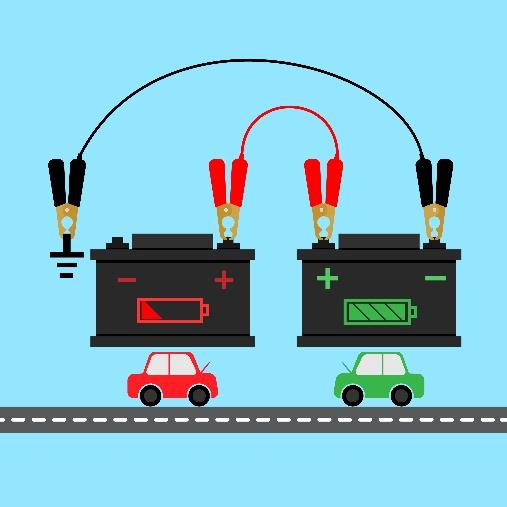Trouble happens. You left your lights on and now you’re stuck with a dead car battery. While learning how to jump-start a car can be easy, there are risks in it if done so incorrectly. As your insurance agent, we care about your safety so we put together the following guide on how to properly get you and your car charged and back on the road.
What do you need to jump-start a car?
Before you can recharge and get going, you need a few basics: jumper cables and a power source – either a portable jump battery (a jump box) or another vehicle.
Jumper cables are long, thickly insulated cables with toothy clips on one or both ends. These clips are called alligator clips. The clips are distinguished by color, usually red and black, to indicate positive and negative polarity. The red clip is positive. The black clip is negative.
Jump boxes are portable batteries used to jump-start a vehicle without connecting to another vehicle and come with special jump cables. These cables connect the jump battery directly to the dead car battery. Roadside assistance usually uses a jump box when helping stalled vehicles.
What do you need to know about car batteries to jump-start a car?
Car batteries have two larger nubs, called terminals. There is a positive terminal and a negative terminal. Each should be clearly marked. Connecting cables to the right terminal is important to complete the circuit and give power to the dead battery.
- Positive terminal – The positive terminal is usually the bigger of the two terminals. It is marked with “POS” or “+”. It will connect to the positive clip on the jumper cable, which is usually red.
- Negative terminal – The negative terminal on the battery is usually marked with “NEG” or “-“. This will attach to the other clip, which is usually black.
CAUTIONS WHEN JUMP-STARTING A CAR:
- READ THE OWNER’S MANUAL. Some cars are not recommended for jump-starting because they have sensitive circuitry
- DO NOT JUMP corroded, cracked, leaking, or visibly damaged batteries
- DO NOT JUMP frozen batteries
- DO NOT JUMP dry batteries
- DO NOT TOUCH CLIPS together. This is true when connected but get in the habit of never touching the clips together.
Protect the donor battery
A quick test that there is enough voltage for the donor, be sure that the car giving the jump start headlights are steady and bright when the car is started. If the headlights dim, that can signal that the battery is low.
How do you use jumper cables to jump-start a car from another vehicle?
- CHECK BATTERIES: Make sure that the battery giving the jump has enough voltage and is a matching voltage system type (12V, 6V, etc.)
- READY CARS: Put both cars in the park or neutral, turn the ignitions off, and put on the parking brake.
- OPEN THE HOOD of each car.
- ATTACH ALLIGATOR CLIPS to the terminals in the following order:
- Red to Dead – Connect red, or positive, clip to the positive terminal on the battery of the dead car.
- Red to Donor – Connect the red, positive, clip to the positive terminal on the donor battery on the other car.
- Black to Donor – Connect the black clip to the negative terminal of the donor car.
- Black to Metal – Connect the black clip to an unpainted metal part of the dead car that is not directly next to the battery. One of the metal struts that hold the hood open is a good place to clip the second black, or negative, clip.
5. START THE DONOR CAR so that the battery can supply power to the dead battery.
6. IDLE the donor car, allowing it to run for a few minutes.
7. TEST the interior light of the car being jump-started. If it goes on, there may be enough power.
8. START the dead car.
After the car is jump-started:
Unclip the clips in the reverse order you connected them:
- The black clip on the unpainted metal
- The black clip from the negative terminal
- Red clip from the donor car
- Red clip from the dead car’s battery
If the jump works and your car starts, don’t shut off your engine! Drive around for at least 15 minutes to recharge your battery. If the car won’t start the next time you use it, the battery isn’t holding a charge and needs to be replaced.
Watch these steps for jump-starting a car from Safe2Drive.
Source: https://www.idrivesafely.com/defensive-driving/trending/how-jump-car-simple-steps-bring-your-car-battery-back-life and https://www.dummies.com/home-garden/car-repair/how-to-jump-start-a-car/

